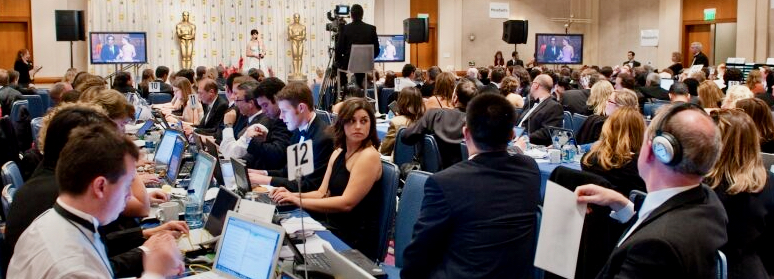
Pundits may praise watching movies on streaming, but the Hollywood establishment gave a full-throated endorsement to pandemic-battered cinema in Sunday’s poorly received Oscars telecast.
ABC Television’s audience plunged 56%, which is a crisis for the Academy Awards organizer that depends on Oscar TV-rights income. But the event will remain a moneymaker because TV advertisers have few mass appeal alternatives in the fragmenting digital landscape. The decline may also be slightly overstated since some of the audience probably migrated to online media for their viewing where they were uncounted.
While its showcase event struggles, Hollywood validated movie theaters — reopening now after going dark amid Covid-19 — with Best Actress winner Francis McDormand saying in her acceptance speech, “Please watch our movie on the largest screen possible and one day very, very soon, take everyone you know into a theater, shoulder to shoulder in that dark space and watch every film that’s represented here tonight.”
On a more organized basis, prior Oscar winner Matthew McConaughey fronted a video message on ABC Television’s pre-awards telecasts for a movie-theater promotion “The Big Screen Is Back.” (A screen grab of McConaughey from this video is at top of this article). A voice-over intoned, “The movies: the way you’ve always loved them [in cinemas] is the way to see them again.” The “Big Screen Is Back” advocacy marketing campaign is primarily financed by industry trade group National Association of Theatre Owners (NATO), and is expected to roll out more stars over time.
Another indication that Hollywood is in cinema’s corner came from Oscar selections. The streamers spend lavishly for movies but voters of the Academy of Motion Picture Arts & Sciences (AMPAS) deny them top prizes. Streamer Netflix was the “studio” with the most Oscar nominations at 36 and its movies won seven Oscars on Sunday. But Netflix went home empty handed in the major categories — the four acting and Best Picture (with two Best films nominated). It’s snubbed year-after-year by Academy Awards voters for those big prizes.

This year, for what is the 93rd Academy Awards, ABC’s telecast averaged 10.4 million viewers (originally announced at 9.85 million, but then upgraded), with a dismal rating of 1.9 in the key ages 18-49 demographic. But the Oscars won its time period and even at its diminished level is among the most popular prime time TV shows on a Big Four broadcast TV network. So advertisers seeking a large audience — particularly females wowed by the Oscars fashions and glamor — have to buy the awards show even as audiences shrink.
The Oscars awards generated $131 million in revenue in 2019, AMPAS revealed in a non-profit disclosure statement, and the bulk of that comes from licensing TV right.
The Oscars telecast will certainly remain on TV but it’s an open question if moneys generated will decline. Last year, the Oscars drew 24 million average viewers and not too long ago held a 40 million average viewership clip.
Why the plunge in TV viewing? A big factor is AMPAS itself. This year’s Oscars suffered from a lackluster crop of films such as Best Picture winner “Nomadland,” which though well-crafted is a dark drama. Pandemic-delayed films in the release pipeline auger more crowd-pleasers next year. AMPAS is also broadening the demographic base of its membership, but those new members continue an Oscar voting tilt to edgy, out-of-the-mainstream films that don’t pull TV audiences to the telecast.
This year’s Oscars awards were designed to be earnest without the usual hokum comedy. The producers said that they were crafting the sensibility of a movie, not a TV show. So look for the whole affair to be retooled. With social spacing due to Covid-19, there was a smallish audience in person that lacked in the star-power of the past. There were no central hosts as presenters were constantly changing. The “In Memoriam” video — a favorite of all award shows recounting who died in the past year — took hard knocks for its bouncy music and uneven, jarring pace of presenting images.
Looking at the TV audience decline, some in the press howled afterwards that the Oscars are now dead. Not true. But the glamorous and historic annual event is troubled and at a crossroads.
Related content:
Leave a Reply